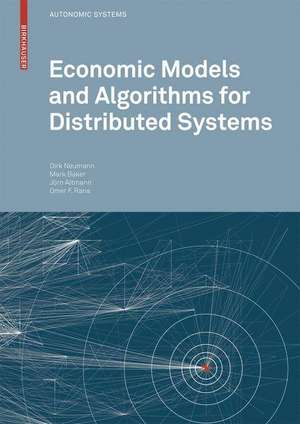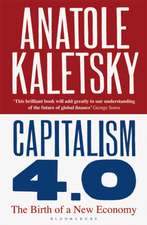Economic Models and Algorithms for Distributed Systems: Autonomic Systems
Editat de Dirk Neumann, Mark Baker, Jörn Altmann, Omer F. Ranaen Limba Engleză Paperback – 7 dec 2009
Preț: 368.40 lei
Nou
Puncte Express: 553
Preț estimativ în valută:
70.52€ • 76.62$ • 59.27£
70.52€ • 76.62$ • 59.27£
Carte tipărită la comandă
Livrare economică 16-22 aprilie
Preluare comenzi: 021 569.72.76
Specificații
ISBN-13: 9783764388966
ISBN-10: 376438896X
Pagini: 276
Ilustrații: VI, 270 p.
Dimensiuni: 155 x 235 x 14 mm
Greutate: 0.41 kg
Ediția:2010
Editura: Birkhäuser Basel
Colecția Birkhäuser
Seria Autonomic Systems
Locul publicării:Basel, Switzerland
ISBN-10: 376438896X
Pagini: 276
Ilustrații: VI, 270 p.
Dimensiuni: 155 x 235 x 14 mm
Greutate: 0.41 kg
Ediția:2010
Editura: Birkhäuser Basel
Colecția Birkhäuser
Seria Autonomic Systems
Locul publicării:Basel, Switzerland
Public țintă
ResearchCuprins
Economic Models and Algorithms for Distributed Systems.- Economic Models and Algorithms for Distributed Systems.- Reputation Mechanisms and Trust.- A Belief-based Trust Model for Dynamic Service Selection.- Reputation, Princing and the E-Science Grid.- Trust-oriented Utility-based Community Structure in Multiagent Systems.- Formation of Virtual Organizations in Grids: A Game-Theoretic Approach.- Towards Dynamic Authentication in the Grid — Secure and Mobile Business Workflows Using GSet.- Service Level Agreements.- Enforcing Service Level Agreements Using an Economically Enhanced Resource Manager.- Extended Resource Management Using Client Classification and Economic Enhancements.- Mitigating Provider Uncertainty in Service Provision Contracts.- Text-Content-Analysis based on the Syntactic Correlations between Ontologies.- Business Models and Market Mechanisms.- Cloud Computing Value Chains: Understanding Businesses and Value Creation in the Cloud.- A Model for Determining the Optimal Capacity Investment for Utility Computing.- A Combinatorial Exchange for Complex Grid Services.- Heuristic Scheduling in Grid Environments: Reducing the Operational Energy Demand.- Facing Price Risks in Internet-of-Services Markets.
Caracteristici
Interdisciplinary approach that combines work from Economics and Computer Science Coordination and incentive problems prevalent to any kind of distributed system are analyzed by means of economic theory Economic theory is put to work by providing evidence (e.g. by prototypes) that the pure concepts are feasible to be implemented in the field Theoretical work is illustrated with experiences from state-of-the-art European projects Addresses many new insights into how to approach coordination and incentive problems Includes supplementary material: sn.pub/extras




















